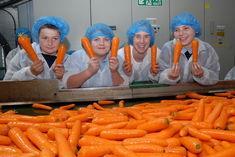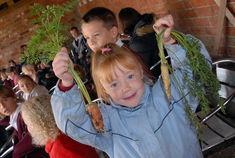


The British Carrot Growers’ Association (BCGA) has achieved media coverage worth three-and-a-half times its original investment in two years of its carrot campaign.
“We launched the campaign proper at the BBC Good Food Show last year, where we handed out 40,000 recipe cards, 50,000 carrot batons and chef Rachel Green demonstrated daily in the Great British Food Theatre,” said Caroline Kenyon, who has been running the campaign for the association.
“We are really proud of how far we’ve come in under two years. In January of last year, we had nothing. Now we have three websites - www.britishcarrots.co.uk, www.carrots4kids.co.uk, and www.carrots4press.co.uk. We have 18 recipes with photographs and 1.1 million stickers went out to schoolchildren last month. Now the industry has a profile - we are constantly fielding calls from the media who want to know more about specific aspects of carrots. We feel we are making a difference.”
The theme of the campaign in 2007 is children and featured what is believed to be the UK’s first ever Carrot Carnival at Doddington Hall in Lincoln, where primary school children learned about carrot production and watched a performance of healthy-eating puppet show Captain Carrot. The show, created by actor Simon Bamford, is being sponsored for the whole year around the UK by BCGA and is set to reach more than 20,000 children before year end.
“We’ve also done some important work in getting the message across from the industry on the implications of supermarket price wars,” said Kenyon. “The detailed release we put out had a huge response, from getting the drive-time slot on the Chris Evans Show on BBC Radio 2, to the Daily Express and Working Lunch on BBC 2.
“The TNS data is good, and also the financial evaluation of the campaign,” said Kenyon. “The budget for the two-year campaign was £120,000, and we’ve achieved more than £400,000-worth of coverage, which represents nearly 3.5 times the investment.”
BCGA chairman Martin Evans said: “I think the big achievement of the campaign is the turnaround in perception of carrots, which is the non-measurable. TNS data alone is not a good measure, as you can always get figures to say what you want them to say. TNS is part of the picture, but you can’t move on until you’ve change perception of a product we’d become complacent about. Producers, retailers, consumers had all become complacent. We had a big negative image to sort out and I think we’ve gone a long way to change that."